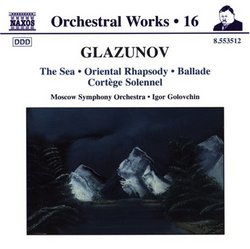| All Artists: Alexander Glazunov, Igor Golovschin, Igor Golovchin, Moscow State Symphony Orchestra Title: Glazunov: The Sea; Oriental Rhapsody; Ballade; Cortège Solonnel Members Wishing: 0 Total Copies: 0 Label: Naxos Release Date: 3/20/2001 Genre: Classical Styles: Forms & Genres, Fantasies, Symphonies, Historical Periods, Romantic (c.1820-1910), Symphonies Number of Discs: 1 SwapaCD Credits: 1 UPC: 730099451222 |
Search - Alexander Glazunov, Igor Golovschin, Igor Golovchin :: Glazunov: The Sea; Oriental Rhapsody; Ballade; Cortège Solonnel
 | Alexander Glazunov, Igor Golovschin, Igor Golovchin Glazunov: The Sea; Oriental Rhapsody; Ballade; Cortège Solonnel Genre: Classical
|
Larger Image |
CD DetailsSimilarly Requested CDs
|
CD ReviewsFantasy, Exoticism, and Nationalism!!!! Uriah Heep | Bloomington, IN | 06/29/2004 (4 out of 5 stars) "If you're reading about this CD, you probably have some interest or experience in the Russian Romantic tradition of the late 19th Century. Even if you are new to this genre of music, this is a great place to start. As usual, the Naxos label offers an exceptional classical recording at a low cost. Almost 70 minutes of wonderful music for only $7!! The Moscow Symphony Orchestra (under Igor Golovchin) performs an excellent interpretation of these works. Alexander Glazunov's orchestral music has, in my opinion, been rather neglected and overshadowed by the popularity of his ballets. This really saddens me, considering the complexity and greatness of these lesser known pieces. Furthermore, Debussy's "La Mer" (1905) and Britten's "Sea Interludes" from Peter Grimes (1945) are so oft performed in concert halls that audiences over time have begun to regard them as the definitive portrayals of the ocean in music. In my opinion, Glazunov tops both of these with his Fantasy for Orchestra in E major, Op. 28 "The Sea" (1889) - then again I will admit I'm a bit biased toward the German and Russian Romantics : ) Fortunately the Naxos label has brought Glazunov more accessible to the public - this disc, by the way, is the 16th in Naxos' series covering Glazunov's orchestral works. I have most in the series, but this remains my favorite. Op. 28: This symphonic fantasy is a highly descriptive, colorful, picturesque portrayal of the ocean in music. Glazunov begins the work with a "wave-like" melody in the bass section of the orchestra. This melody gains intensity then is relinquished into several beautiful motifs noted by the flute and harp glissandos. The intensity again rises as Glazunov writes a "storm-at-sea" into the piece which is simply magnificent - one can recognize the influence of Wagner on the young Glazunov (he was around 25 at the time). It is at this point (about 15 minutes or ¾ of the way into the piece) where the powerful horn section representing the storm secedes. The remainder of the work is an evocative diminishment carried wonderfully by the wind section and echoed by the strings - calm and tranquility are finally restored. The composer ends with one last "wave motif" in the double basses, suggesting the repetition of this natural cycle at sea. In Op. 28 Glazunov shows the many faces of the sea - it is beautiful yet it is very powerful and can be dangerous and destructive.While Op. 28 is richly orchestrated and performed superbly by the MSO (who does not get enough recognition in the world of classical music recordings by the way!), the true gem on this disc is Glazunov's Oriental Rhapsody (1889). This is a program work, divided into 5 movements and clocking in at around a half hour. Exoticism remained an important trend in the late Romantic period and here Glazunov incorporates it beautifully. Op. 29 begins with the subdued horn call of a night watchman. It is a repeated a few times until the main theme is developed - a gorgeous, heart-rending melody delivered by the cellos and supported by the harp and violins. A small, rural, peaceful village comes to mind when one hears this movement. Near the end the watchman's theme is repeated and one is prepared for the next movement, which is a lively Asian dance played first by the oboe and then flushed out by the strings and the rest of the orchestra. One also hears a peculiar use of the tambourine in this movement as well which adds a Turkish flavor. The dance gets faster, wilder, and more passionate as the movement progresses. Glazunov displays his exceptional skill with the dance form here that is seen in his ballets. One wonders if Reinhold Gliere picked up a few ideas here when writing his Orient-inspired ballet "The Red Poppy" (1927). An abrupt end to the dance brings the listener into my favorite movement of this piece ("An old man's ballad"). The opening of the ballad never ceases to interest and amaze me - the grave, heavy chords of the lower strings accompanied by the harp. This brief intro is followed by a rising melody in the woodwinds that seems to suggest a wise old man looking at those around him and softly saying "Let me tell you a story..." or "Once upon a time...". Glazunov brilliantly sets the mood for what is to follow. The ballad itself or "the central theme" of the movement is first assigned to violins. This poignant narrative section is then entrusted to the wind section. It is then developed into a fanfare in the horn section, providing a perfect bridge to the final movements, which begin with a joyous military celebration; victorious armies are returning home from battle. Several brief flashbacks to the earlier sections are here, giving the work a sense of unity and cohesion. Finally, the dance concludes and the composer, in a celebration of sound, concludes the piece with a triumphant horn section serving as a recapitulation of major themes. The timpani provide the "exclamation point" and help create a fiery, very Russian ending.Glazunov's Op. 78 Ballade in the key of F major (1902) also deserves a good listen. Beginning and ending with lush, moving, slower segments, the central section is filled with a 3 minute hymn - sounding somewhat militaristic and regal with its repeating drum rolls. This work also displays a maturer and more subdued Glazunov - here he has really developed his own style as a composer and it shows. The last work on the disc, the "Cortège solennel" (1910), is a simple, stately fanfare/hymn dominated by the brass section and percussion. Here, Glazunov gets nationalistic and patriotic, composing an anthem-like piece for his Mother Russia. A smashing, triumphant ending to a great CD!" Beautiful moody music W. Jamison | Eagle River, Ak United States | 03/07/2006 (4 out of 5 stars) "This is a wonderful find! "The Sea" makes this CD a great buy all by itself. There are just so many gems waiting to be discovered. How can we listen to them all?" Une berceuse russe Philippe Landry | Louisiana | 12/17/2007 (5 out of 5 stars) "There really is nothing I can say that hasn't been said already. Naxos is becoming the only classical label I look to. Their recordings of minor Russian works are fresh and exciting. Nothing but gems! This collection of Glazunov pieces couldn't be a better grouping. Subtle, articulate, fluid -- very rewarding listen. I just wish the mix were a little louder; the level is too reserved for such rich sound. All in all a five star disc and a perfect place for Russophiles just discovering Naxos."
|

 Track Listings (8) - Disc #1
Track Listings (8) - Disc #1







